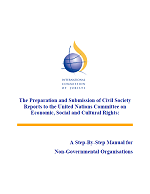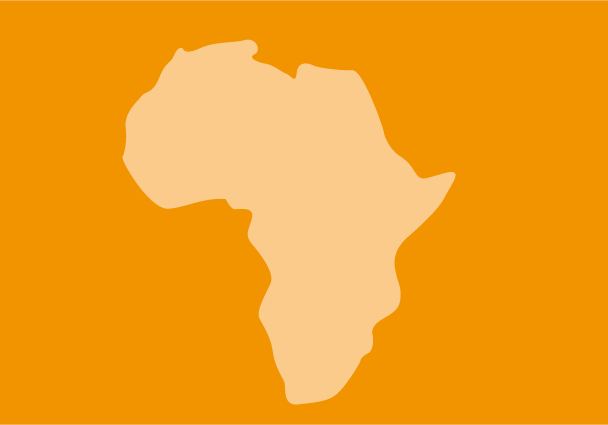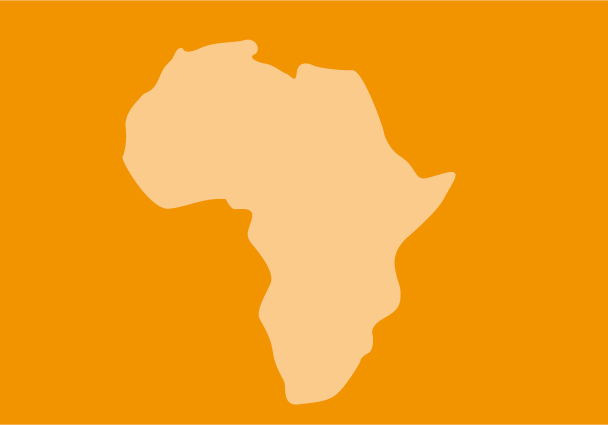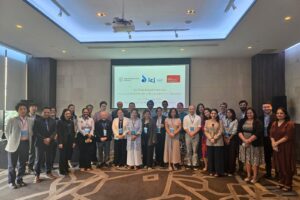
Jul 27, 2004
 Summary: This manual was prepared by the International Commission of Jurists (hereinafter “ICJ”) as a means of assisting a wide-range of non-governmental organisations in producing effective civil society reports for submission to the United Nations Committee on Economic, Social and Cultural Rights (hereinafter “Committee”), the body charged with monitoring State party compliance with the implementation of the International Covenant on Economic, Social and Cultural Rights (hereinafter “ICESCR” or “Covenant”).
Summary: This manual was prepared by the International Commission of Jurists (hereinafter “ICJ”) as a means of assisting a wide-range of non-governmental organisations in producing effective civil society reports for submission to the United Nations Committee on Economic, Social and Cultural Rights (hereinafter “Committee”), the body charged with monitoring State party compliance with the implementation of the International Covenant on Economic, Social and Cultural Rights (hereinafter “ICESCR” or “Covenant”).
Submissions to the United Nations Committee on Economic, Social and Cultural Rights : A step-by-step manual for non-governmental organisations [full text, PDF]

Oct 28, 1996
Les missions d’observation d’élection ont pour but d’assurer la transparence et le bon déroulement du processus électoral.
L’opération d’observation porte sur l’ensemble du processus électoral, à savoir l’enregistrement sur les listes électorales, la campagne électorale, le scrutin, son dépouillement et sa proclamation. Elle s’effectue sur l’ensemble du pays.
La mission d’observation d’élection s’effectue en tenant compte de divers paramètres portant tant sur le scrutin lui-même que sur les comportements à adopter. Ainsi les observateurs internationaux ont principalement un rôle d’observation, de témoin. ils doivent travailler dans le respect des principes d’indépendance, d’objectivité et de neutralité. Ils ne doivent en aucun cas interférer ou s’immiscer à quelque niveau que ce soit du processus électoral, même en cas d’irrégularité, pour opérer des modifications, donner des avis sur la r”açon de mener le processus, ni intervenir pour régler des problèmes de la compétence des agents électoraux. Les observateurs ne doivent pas agir de manière préjudiciable au processus et doivent se baser sur des faits réels, dignes de foi. Leur mission est avant tout de constater que les élections sont
menées conformément aux principes d’une élection libre, juste et impartiale.
Trois étapes doivent être distinguées dans le processus électoral: l’observation en amont (phase préparatoire), l’observation pendant le déroulement du scrutin (phase d’observation proprement dite) et l’observation en aval (proclamation des résultats et suivi des élections). Les paramètres à prendre en compte sont les suivants:
- L’évaluation du contexte politiqué, social, culturel, économique et juridique du pays:
- Le régime électoral
- Les candidats (partis politiques représentés, pluralisme assuré)
- Les médias
- Description du scrutin (visite des bureaux de vote, contrôle de la régularité des scrutins, transparence et absence de fraude).
Guide pratique observateurs elections-publications-1996-fra (full text in French, PDF)

Jan 1, 1994
In light of the potential role of paralegals as a catalyst for rural development in Africa, the ICJ has, in terms of its LRSA (Legal Services in Rural Areas) programme, organised paralegal training seminars in over ten African countries. These have resulted in the launching of national LSRA projects for the further consolidation of paralegal work in the participating countries. In all these seminars the need for a Trainer’s Manual had been expressed by the participants.
The manual contains ten chapters:
- Understanding the Concept of Paralegals
- The Roles and Skills of Paralegals
-
Developing a Paralegal Scheme
-
Deciding on the Type of Training
and Selecting Trainees
- Curriculum Development
-
Understanding and Facilitating
the Learning Process
- Logistics
-
Producing Material and the Plain Language Process
- The Teaching Process
- Monitoring and Evaluation
With List of organizations involved in paralegal work in Africa and References.
The manual was written by Amy S. Tsanga and Olatokunbo Ige.
Africa-paralegal trainers manual-training module-1994-eng (full text in English, PDF)
Africa-paralegal trainers manual-training module-1999-fra (full text in French, PDF)

Jan 1, 1992
Practical guide on the African Commission on Human and Peoples’ Rights (ACHPR) and its procedures.
Following the 1991 NGO Forum in Banjul, the ICJ published this guide to enhance the understanding of African NGOs on the ACHPR. This guide is aimed at individuals, groups and NGOs who wants to use the communications procedure. This guide also includes themes such as: the African Commission and its role in promoting and protecting human rights, how to obtain an observer status to the Commission, who can address communications, admissibility conditions, the role of the Organization of African Unity (OAU) and what to do in case of emergency.
Africa-ACHPR communications-guide-1992-eng (full text in English, PDF)
Africa-ACHPR communications-guide-1992-fra (full text in French, PDF)
Africa-ACHPR communications-guide-1992-ar (full text in Arabic, PDF)

Jan 1, 1991
The ICJ has been promoting a series of seminars in Asia, Africa and Latin America on the provision of legal services to the rural poor and other disadvantaged groups.
The purpose is to discuss how the poor and disadvantaged can be provided with the basic legal services which more affluent people enjoy.
This manual, written by D. Gnanapragasam and D. J. Ravindran, acts as a training programme for lawyers, law teachers, law students, and representatives of legal aid, human rights and development organisations (in Asia) working in rural areas and involved in training paralegals. The training manual will facilitate local organisations to plan and implement training programmes without seeking continuous help from international organisartions. This manual was prepared to help legal services organisations and trainers to:
- design, implement and evaluate training programmes for paralegals; and
- integrate effective learning and teaching methods into such training programmes.
Paralegal training programme-manual-1991-eng (full text in English, PDF)

 Summary: This manual was prepared by the International Commission of Jurists (hereinafter “ICJ”) as a means of assisting a wide-range of non-governmental organisations in producing effective civil society reports for submission to the United Nations Committee on Economic, Social and Cultural Rights (hereinafter “Committee”), the body charged with monitoring State party compliance with the implementation of the International Covenant on Economic, Social and Cultural Rights (hereinafter “ICESCR” or “Covenant”).
Summary: This manual was prepared by the International Commission of Jurists (hereinafter “ICJ”) as a means of assisting a wide-range of non-governmental organisations in producing effective civil society reports for submission to the United Nations Committee on Economic, Social and Cultural Rights (hereinafter “Committee”), the body charged with monitoring State party compliance with the implementation of the International Covenant on Economic, Social and Cultural Rights (hereinafter “ICESCR” or “Covenant”).







